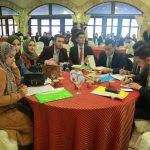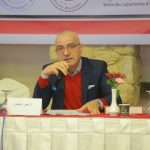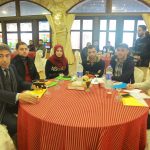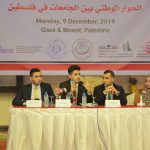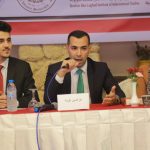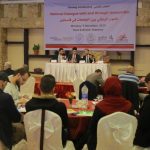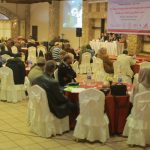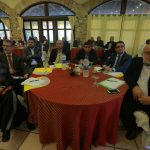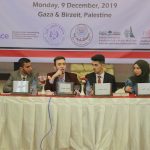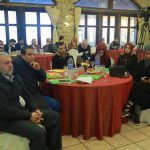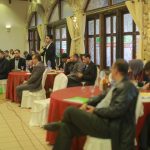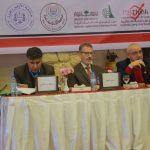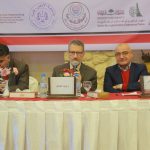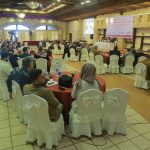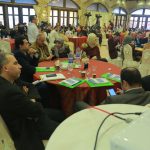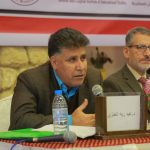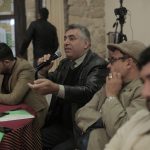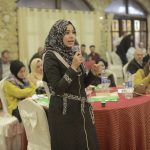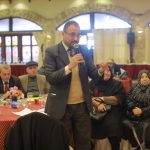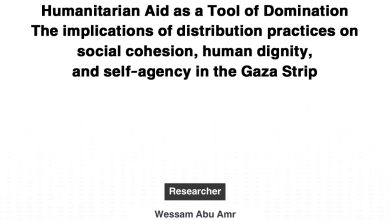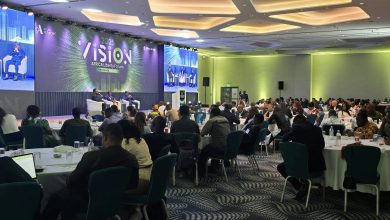From Gaza and the West Bank: University Students Gather Towards A National Reconciliation
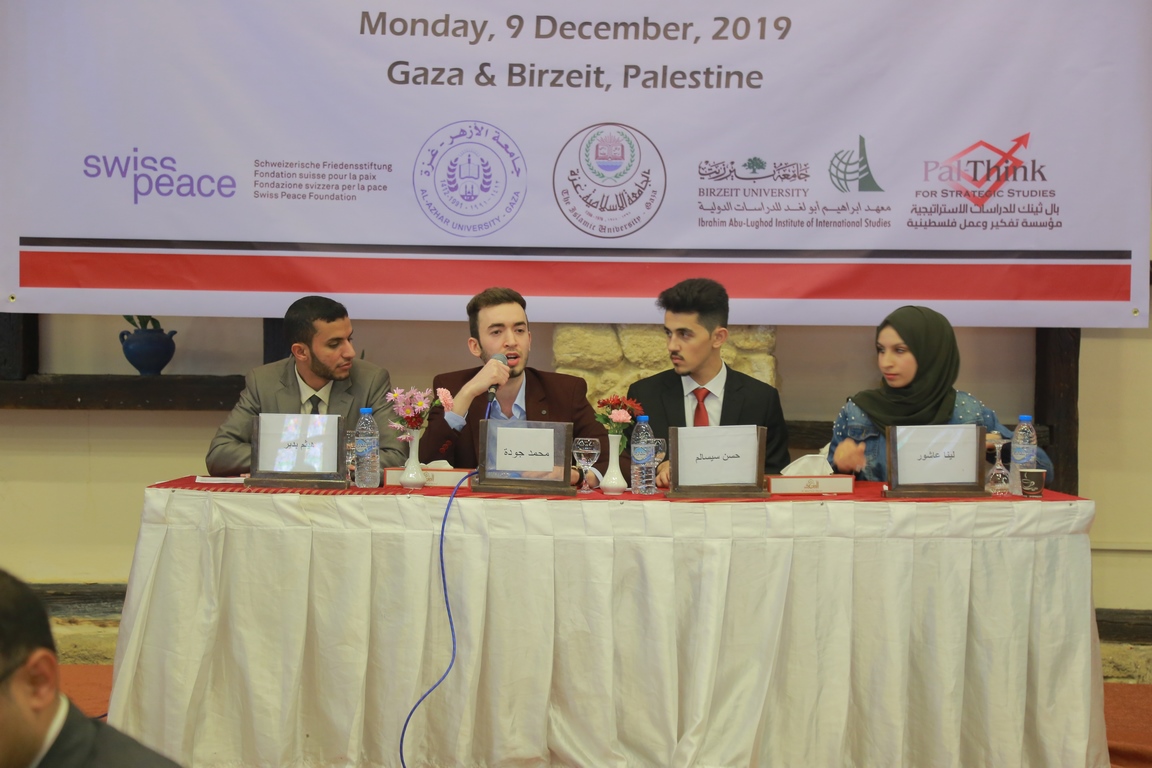
In partnership with Al-Azhar University of Gaza, Islamic University of Gaza and Swiss Peace Organization and with support from the Swiss Government, Pal-Think for Strategic Studies and Birzeit University organized the closing conference for the project titled “National Dialogue Amongst Universities in Palestine”. More than 170 people of elite academics, researchers, professors and university students attended the conference.
” We are one people and there is no actual division. We have more similarities than differences. We work on the same cause that the division made” Dr. Abdalrahman Ibrahim, Dean of General Administration and Law at Birzeit University, opened the ceremony via video conference.
Mr. Abdallah stressed that the division is a saddening issue for the Palestinian history and it can be solved by possessing a political determination. He referred that the students assemblies adopt creative ideas to control the consequences of the division.
Director of Pal-Think for Strategic Studies, Mr. Omar Shaban, added that Pal-Think, for over 10 years and in cooperation with Swiss Peace, exerts effort as it is a Palestinian and independent institute working both in the area of reducing the yawning gap amongst the organizations in Palestine and in actualizing the Palestinian unity and reconciliation.
“The sector of education is part and parcel of the Palestinian national movement as thousands of political leaders graduated from Palestinian university. So, the participating students today will present themselves and speak on the consequences that the Palestinian division caused. Today, we will see students from Birzeit University, Al-Azhar University and Islamic University all together. Mr. Omar said.
The ceremony included three panel sessions that discussed different research papers that participating students and academics prepared on several topics related to the Palestinian division.
Hasan Sisalem, senior student at Al-Azhar University and Huthifa Hamed, student at Birzeit University, moderated the first session titled “Consequences of Palestinian Division on Students”. Ezz Qotta, fresh graduate from Islamic University, discussed his research paper titled ” Consequences of Palestinian Division on the Elections of Students Assemblies in Palestinian Universities”. Ezz highlighted that the absence of elections, students assemblies and political circumstances in Palestine all negatively affected the lifestyle of students.
Fayrouz Salama, student at Birzeit University, had her paper titled “Consequences of Palestinian Division on Students Activity”. Through her paper, shed discussed vocal points regarding the factors of disassociation of youths movements seeking to put an end to the Palestinian Division.
Ala’a Abusweireh, student at Al-Azhar University, talked about her research paper titled “The Effect of Division on the Palestinian Universities and Its Reflection on University Students”. Following her speech, she stated that universities abide by two separate administrations one of which is in the West Bank and the other is in Gaza not to mention that there are 8 universities and colleges in Gaza that are not certified by the Ministry of Education – Ramallah; this jeopardizes the future of over 25,000 students.
Student at Birzeit University, Amal Manasra, illustrated through her research paper titled “General Palestinian Elections: Challenges” the availability of applying the Palestinian elections. In addition, she talked about the scenarios expected and Arab countries situation towards the reconciliation. “Elections alone will not solve the crisis of the division, yet deepened it will be” She added.
Consequently, the second session was moderated by Haytham Badeer, student at Islamic University, and Rami Al-Khadoor, student at Birzeit University, who continued presenting their research papers pertaining to the consequences of the Palestinian division on the students’ collage lives.
Mohammad Joudah, student at Al-Azhar University, through his paper titled “Role of Students Assemblies in mid of Palestinian Division” talked about the hurdles that students face at universities including the current Palestinian political system, disability to make decisions and political-background differentiations which all contributed in freezing the students’ roles in making a difference.
Lina Ashour, student at Islamic University, shed spotlight, through her research paper titled “Lifestyle of University Students in Light of Division and Economic Deterioration”, on three areas which are the division and economic deterioration, consequences of the Palestinian division on the Palestinian student and the consequences on university graduates.
Following the event, Mr. Omar Shaba, Director of Pal-Think, moderated the third panel session along with Marah Khalaf from Birzeit university which was titled “Consequences of Palestinian Division on the Academic Journey at Palestinian Universities”. Through this session, Dr. Lord Habash, at Birzeit University, discussed his research paper titled “Initial Review on Birzeit Professors’ Discourses Regarding Palestinian Cause and Role of Universities Towards the Division”.
Dr. Waleed Mudalal, Islamic Univeristy, discussed his research paper titled “Vision of Professors at Islamic University Towards Palestinian Reconciliation and End of Division”. His paper accentuated that the division affected all lives’ aspects including the academic life. In addition, the universities did not play an effective role in ending the division in spite of possessing human and financial resources.
Dr. Abdrabuh Al-Anzy, Al-Azhar University, referred, through his research paper titled “Role of Academics at Al-Azhar University Towards Palestinian Reconciliation”, that one of the chief challenges academics face is the political abandonment which means that most of them are desperate and disillusioned due to that current state of affairs.
At the end of the third session, there was a video produced the three participating universities that addressed the real consequences of the Palestinian division on the Palestinian people.
It is worth mentioning that this project continued for one year, included diverse activities jointly between the three universities in addition to that there was a training course organized during the project.

